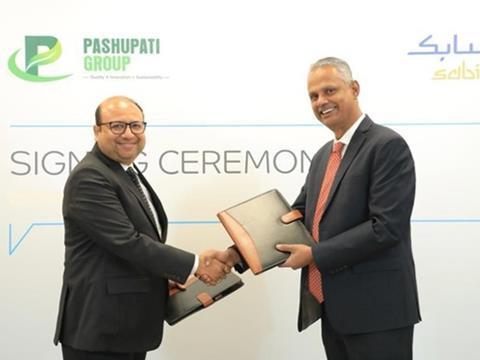
SABIC and Pashupati Group have joined forces to enhance local business opportunities for used plastics in India, which includes converting plastic waste into pyrolysis oil for use as feedstock in the production of SABIC’s certified circular polymers.
Pashupati Group recycles plastic waste and supplies polyolefin pellets, packaging bags, and other recycled products across the northern, western, and southern regions of India. It aims to lower demand for virgin plastics and reduce plastic pollution by recycling, upcycling – and, where it is believed to be necessary, downcycling.
After signing a Memorandum of Understanding (MoU), Pashupati Group and SABIC intend to exchange knowledge and share best practices regarding used plastic material. This is set to include developing methods and adding value to the processing and use of virgin and recycled polyolefin, encompassing compounded and non-compounded end products.
Pashupati will provide its knowledge of mechanical and chemical processing, while SABIC’s contribution will lie in the marketing and sales of recycled products. An advanced recycling project has also been planned; it will turn used plastic into pyrolysis oil, which SABIC will then use in the production of certified circular polymers that claim to offer the same performance properties as virgin plastics.
These polymers form part of SABIC’s TRUCIRCLE portfolio. Other products and services include mechanically recycled products, certified renewable polymers from biobased feedstock, products designed for recyclability, and closed-loop initiatives designed to keep plastics in a high-quality loop and prevent waste.
Additionally, the collaboration hopes to capitalize on increasing circularity-minded pursuits in Asia.
“We are very pleased about collaborating with Pashupati Group,” says Sanjay Mishra, general manager, Engineering Thermoplastics & Performance Polymers at SABIC. “This is a crucial first step in our efforts to support and accelerate the transformation of India’s plastics economy towards circularity.
“At the same time, it expands our collaboration with experienced local recyclers in Asia as we are continuously sourcing valuable feedstock to meet the growing demand for our TRUCIRCLE portfolio of recycled, circular polymers.”
Bankey Goenka, managing director at Pashupati Group, adds: “This MOU is an amalgamation of two champions in their own fields: Pashupati Group, a leader in plastic recycling providing quality recyclates (PET & Polyolefin) including recyclates from mountain and ocean-bound plastics to the global market with a proven track record over two decades, and SABIC, a market leader driving innovative products and solutions for a circular plastics economy.
“This is a testament to the commitment of both SABIC and Pashupati Group towards the circular economy and contributing to the conservation of our planet.”
The announcement comes as Greiner Packaging and Plastic Bank announce an extension of their partnership to pick up plastic waste in coastal areas in the Philippines. Reportedly, the collaboration has resulted in the removal of 610 tons of plastic from the natural environment since the project began.
Meanwhile, another Memorandum of Understanding – this one non-binding – saw Carbios and Landbell Group agree to source, prepare, and recycle 15kT of post-consumer PET waste every year from 2026 using Carbios’ enzymatic degradation process.
If you liked this story, you might also enjoy:
Report: The ultimate guide to global plastic sustainability regulation
The Brief: Oxo-(bio)degradables: the who, what, and why of breaking down fossil-based plastics
Sustainable Packaging Summit: How Kraft-Heinz uses collaboration to drive innovation
The Brief: Using ocean-bound plastic in packaging – how, why and should we?














No comments yet